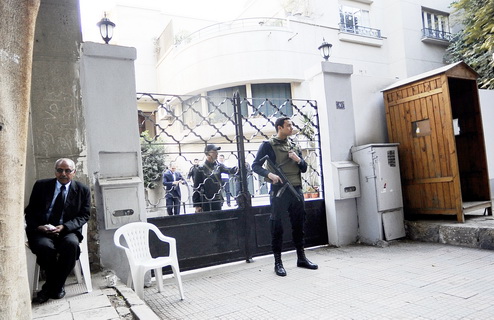The flight path from Abu Dhabi to New York routes directly through Iraqi airspace, and from 32,000 feet, the Fertile Crescent is an oasis of calm. Streaks of dark green punctuate a thick lattice of azure river valleys and creme-colored sand. A sense of order — natural and manmade — permeates the horizon. But on the ground, especially in Baghdad these days, organized chaos (for now, primarily of the political variety) is emerging.
Making sense of Iraq’s post-March 7 election mess has become something of an analytic parlor game — even before all the votes were counted. But as the West holds its breath, this much appears increasingly certain: maintaining order will be less an American priority than an Iraqi responsibility.
Iraq’s most recent parliamentary voting was, by all accounts, a step toward democratic order. Prime Minister Nouri Al-Maliki’s State of Law coalition was expected to cruise to an easy victory, but with 95 percent of the vote counting complete, Iraqia, the rival cross-sectarian bloc led by ex-prime minister Iyad Allawi, was slightly ahead. The Iraqi National Alliance, a coalition of Shia religious groups — which includes followers of radical Shi’ite cleric Moktada al-Sadr — remains third. Yet no bloc is expected to win a majority in the 325-member Council of Representatives, and ruthless political jockeying will be needed to form a ruling coalition. Official results could be certified by the end of the month.
More troubling than tallies and coalition-building, however, may be the underlining trends in Iraq’s voting tendencies. Iraqis are still voting along sectarian and ethnic lines, considered a harbinger of bad politics and general instability. An election campaign driven in part by a de-Baathification agenda helped solidify State of Law as a mainly Shia-oriented Iraqi nationalist coalition, and Iraqia as a somewhat more Sunni-oriented one. So while Iraqis express disdain for sectarianism, they continue to vote along sectarian lines. National consensus remains elusive.
Forming a government in such a charged political atmosphere will be painful; Maliki is already wooing allies and angering rivals. Iraq’s constitution contains no provision for governing in the post-election period, and determining the role of the transitional government will pose a significant initial challenge. Jockeying over Iraq’s largely ceremonial presidential post — which will nonetheless set the course of the country’s elected government — is also heating up.
While Iraqis sort out their electoral difference, regional trepidation is building. Iraq’s Arab neighbors worry that a strong showing by Shia in Iraq could embolden Tehran and further weaken Iraq’s Sunni minority, potentially destabilizing the country. Dar Al Hayat columnist Hassan Haidar writes that while "politics is on its way to replacing instincts in the new Iraq," foreign influence–notably Iran’s role in feeding sectarian divisions — will continue to test Iraqis’ resolve. And Abdullah Alshayji, a political scientist at Kuwait University, observes that the sectarian, ethnic and regional slant to voting means Iraq "has a long way to go down the road of participatory politics."
Regardless of which bloc comes out on top in the polls, rival groupings could outflank the poll winner and form their own coalition government. Comparisons are already being made to violence in the aftermath of parliamentary voting in December 2005. The predictable battles this time around could strain Iraq’s fledgling political institutions and complicate the planned drawdown of US forces.
Yet complicate doesn’t mean derail, and the Obama administration is sticking by its timeline: by August, only 50,000 US troops will remain in Iraq, down from roughly 96,000 American troops in Iraq now. The top US commander in the region, Gen. David H. Petraeus, reiterated this position on March 16 during congressional testimony. Under current plans, American troops are slated to leave Iraq completely by 2011, though some defense analysts have called for an indefinite extension. But ironically, the strong showing by Iraq’s Sadrists on March 7 — the expectation is they may come away with 40 or more seats — may prevent a renegotiation of the United States’ withdrawal plans.
It’s far too early to term Iraq a permanent success. The political turbulence following the March 7 vote — and the wave of violence that punctuated it — illustrates just how long the road for Iraq truly is. But for all the warning signs, March 2010 is a far cry from the tumult of years past. Violence is down across the country, and civilian deaths are at an all-time low. Increasingly, Iraqis are turning to politics to solve disputes (even if threats of violence lurk just below the surface). And no matter the vantage point, that’s a picture the United States appears willing to live with.
Greg Bruno is a staff writer for CFR.org, the website of the Council on Foreign Relations. This commentary is published by DAILY NEWS EGYPT bitterlemons-international.org.

